#anna petrovna
Explore tagged Tumblr posts
Text
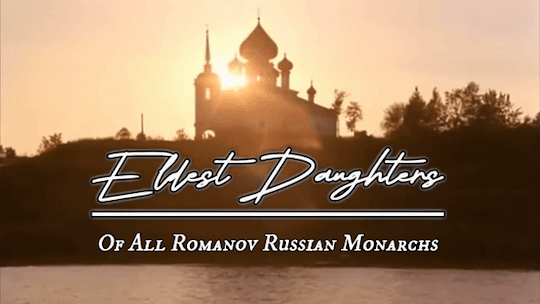

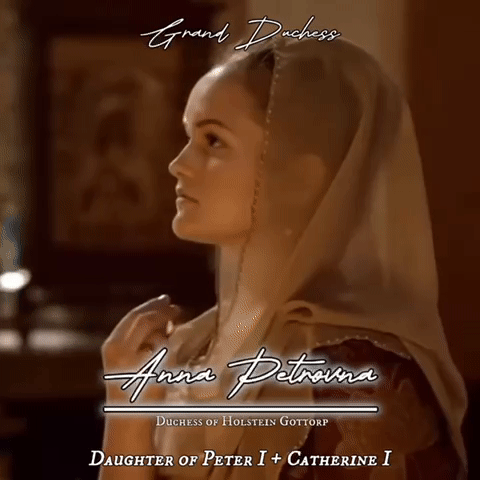
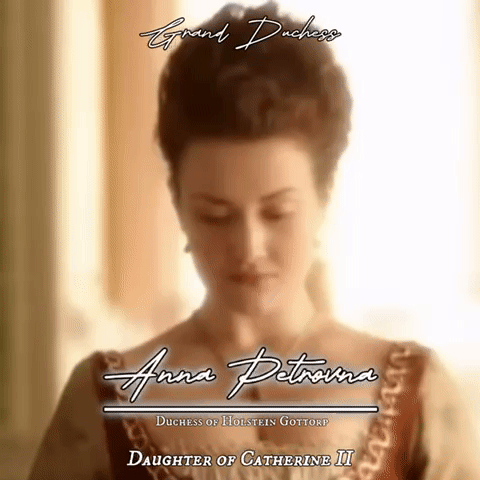
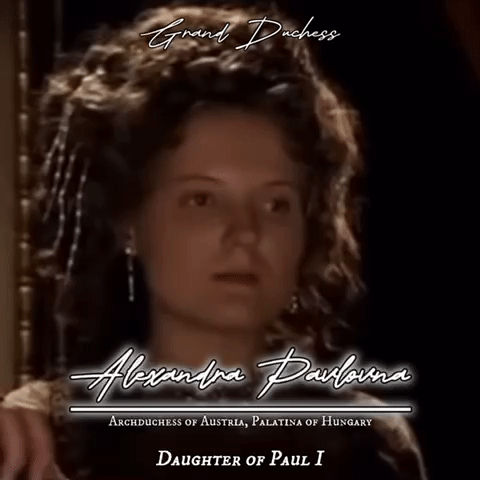
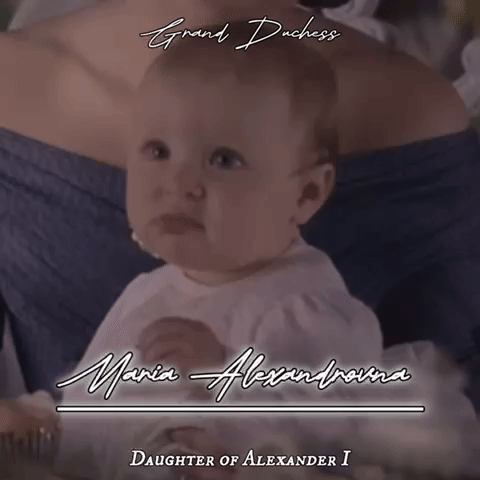
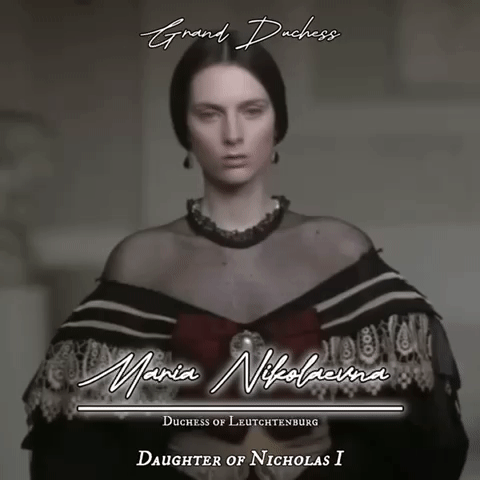
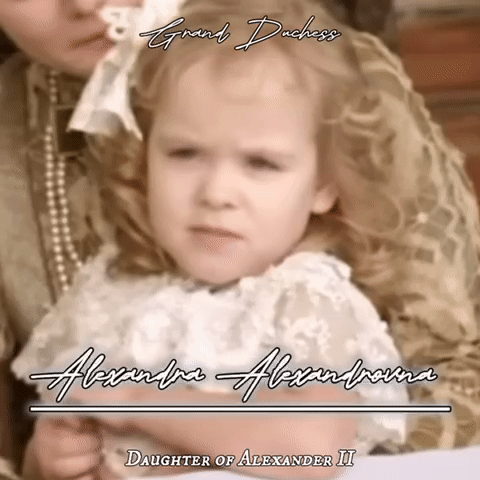
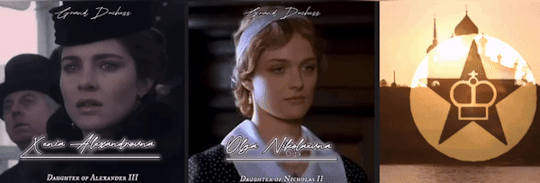
Eldest daughters of all Romanov Monarchs of Russia gifset
❦
#my first gifset!#it turned out okay but I will keep improving#Romanovs#Romanov#russian imperial family#Russian history#irina mikailovna#tsar mikhail I#evdokia alexeivna#tsar Alexei I#Catherine ivanovna#tsar Ivan v#Anna petrovna#Peter the great#Catherine I#Catherine the great#Alexandra pavlovna#tsar Paul I#maria alexandrovna#tsar Alexander i#Maria nikolaevna#tsar Nicholas I#Alexandra Alexandrovna#tsar Alexander III#xenia alexandrovna#tsar Alexander ii#olga nikolaevna#tsar nicholas ii#my edit#made by me
62 notes
·
View notes
Text
The Lost Grand Duchesses: Part 1 - Anna Petrovna

Anna Petrovna was born in January 1708, officially out of wedlock. Her father, Peter ‘the Great’, had six daughters; Ekaterina, Anna, Elizaveta, Maria Natalia, Margarita, and Natalia. Peter planned to marry every daughter that survived infancy to a European house in order to consolidate alliances and friendships with Russia. Peter did not raise Anna, instead giving her to his younger sister Natalia Alexeievna and her husband Alexander Danilovich to raise. Peter’s plan to use the girls as alliance pawns influenced their childhood greatly; their education included embroidery, literature, dancing, and etiquette in order to be perceived as proper and lady-like. By her teenage years, Anna could speak five languages, no doubt to make her more attractive to European houses. Meanwhile, Peter’s sons were taught geography, history, and mathematics.
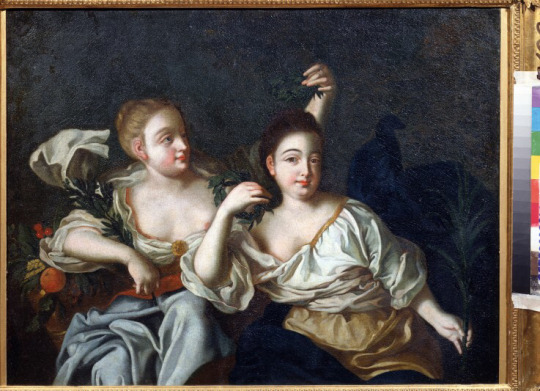
In 1721, serious marriage was on the table. Karl Friedrich of Schlewsig-Holstein-Gottorp was called to Russia, in order to meet Anna and her father. Karl had just entered his twenties, and his denouncers insisted that he was rude and arrogant. In comparison, Anna was barely thirteen years old, and incredibly shy.
This did not deter Peter, who was incredibly attracted by the idea of a Schleswig-Russian alliance. After a few years of shopping for other potential candidates, the marriage contract was signed. Ironically, the bride was not on the contract, and it was her father Peter and Karl Friedrich who signed. When the men signed the contract, Anna’s right to the Russian throne was instantly revoked.

In 1725, less than a year after the marriage between Anna and Karl Friedrich, Peter ‘the Great’ fell seriously ill. He called for Anna, whom he asked to write his will under his dictation. There has been great speculation over whether Peter planned to name Anna his heir; even though she had been forced to revoke her right to succession when her marriage was arranged, the Tsar of Russia still retained the power to elect his own heir regardless of the marriage contract terms. Peter was unable to speak, passing away shortly after, before declaring his heir. Whether or not Peter desired to make Anna heir remains one of history’s big ‘’what if’ questions.
In 1727, Anna and her husband Karl Freidrich moved to his native Kiel. Anna was deeply unhappy, missing her sister and nephew Peter Alexeievich; the Grand Duchess loved children. She wrote copious letters to her sister, Ekaterina, detailing her depression at being taken away from her home country. The rumours of Karl Freidrich’s arrogance appeared true; he preoccupied himself with affairs, leaving a pregnant Anna isolated.
In February, Anna gave birth to a baby boy, named Carl Peter Ulrich. Just days after, Anna contracted Puerperal fever, then known as ‘childbed fever’, a postpartum infection most likely caused by contaminated medical equipment and/or the medical staff not practicing proper hygiene. Anna became gravely ill, and requested to be buried back in her homeland, alongside her father in St. Petersburg. Her son Carl Peter survived the labour, and outlived his father, becoming the Duke of Holstein-Gottorp. When his aunt Elizaveta, Anna’s sister, died in 1762, Carl Peter became the Tsar of Russia, adopting the name Peter Feodorovich, Peter III.

Despite refusing to parent Anna himself, trying to marry her off when she was a child, and signing a marriage contract without Anna’s signature of consent, Peter claimed that Anna was his ‘favourite daughter.’ Only three of Peter’s fifteen legitimate children survived into adulthood. Anna died when she was only twenty years old. Her brother, Alexei Petrovich was imprisoned and tortured under the order of his father, dying from the torture. Only Anna’s beloved sister Elizaveta survived unscathed - the only out of fifteen siblings.

#the lost grand duchesses#anna petrovna#petrovichi#peter the great#he sounds like a tosser#alexei petrovich#old romanovs#russian history#romanov family#1700s#18th century#royal history#womens history#women in history#peter iii
30 notes
·
View notes
Text
Closing the 1720s for now -
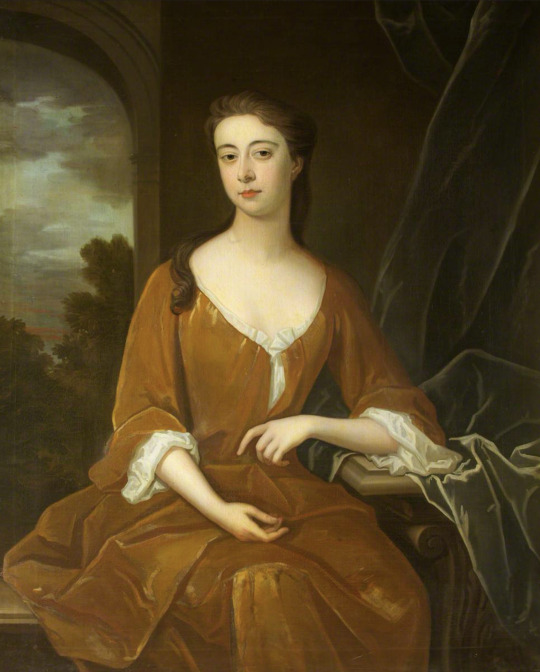
1720s Barbara Ivory (d.1748), Mrs Henry Davenport III by Charles d' Agar (Lacock Abbey, Fox Talbot Museum and Village - Lacock, near Chippenham, Wiltshire, UK). From artuk.org 1517X1889.

1721 (after) Tsarevna Anna Petrovna by Ivan I Grigoryevich Adolsky (Hermitage). From arthermitage.org-Ivan-I-Grigoryevich-Adolsky-Portrait-of-Tsarevna-Anna-Petrovna.html 1173X1475.
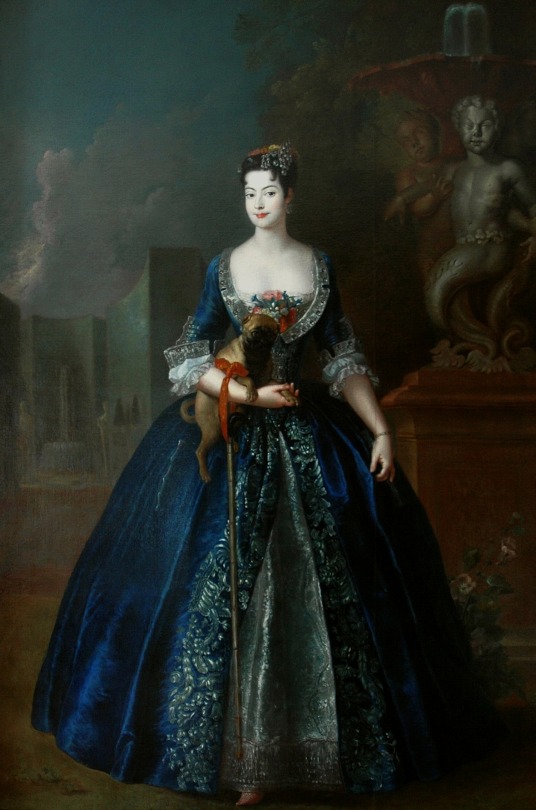
ca. 1728 Anna Karolina Orzelska by Antoine Pesne (Muzeum Narodowe w Warszawie - Warszawa, Poland)). From Wikimedia 1500X2267.
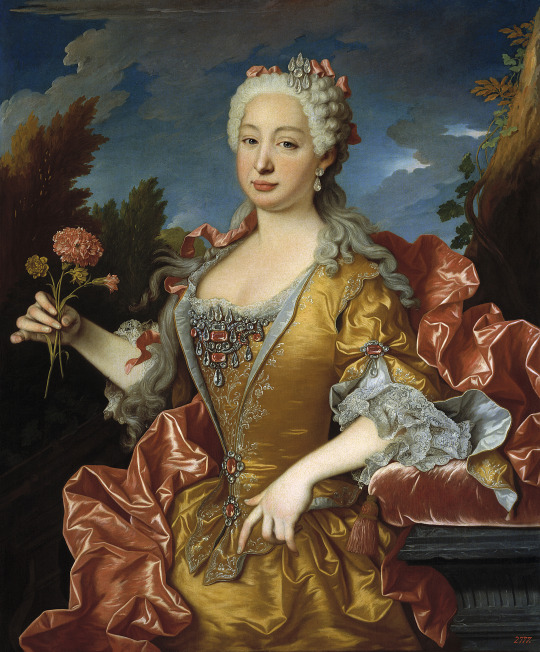
ca. 1729 Queen Maria Barbara of Spain, née Portugal by Jean Ranc (Museo del Prado - Madrid, Spain). From their Web site; fixed spots w Pshop 2445X2953.
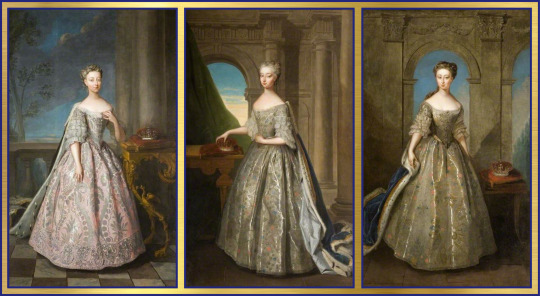
1728 Princess Amelia Sophia, Princess Royal Anne, and Princess Caroline Elizabeth by Philip Mercier (all three at the Hertford Magistrates' Court - Hertford, Hertfordshire, UK). From tumblr.com-search-18th+century 1996X1093.
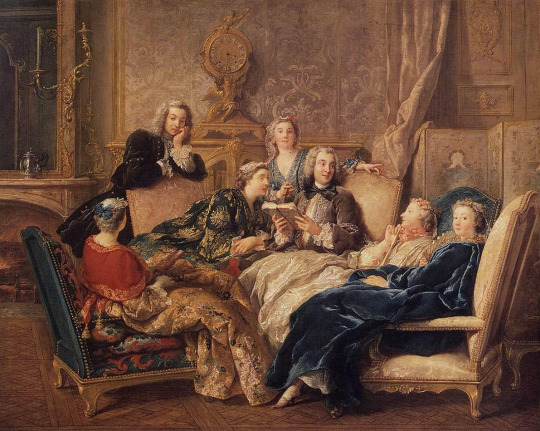
1729 A reading of Mollière by Jean-François de Troy (location ?). From Wikimedia 1191X950.
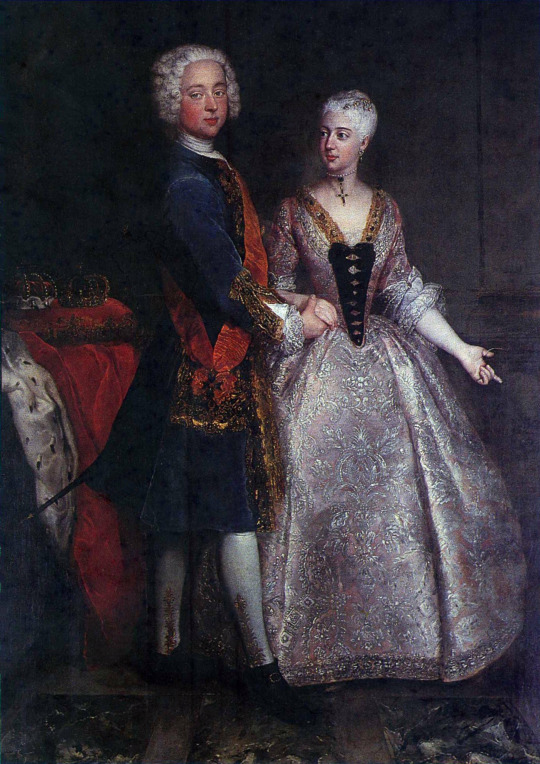
1729 Wedding portrait of Friederike Luise and Karl Wilhelm Friedrich by Antoine Pesne (Schloss Charlottenburg - Berlin, Germany). From Wikimedia 1400X1980.
#1720s fashion#Rococo fashion#Georgian fashion#Louis XV fashion#Barbara Ivory#Charles d' Agar#Anna Petrovna#Ivan I Grigoryevich Adolsky#court dress#Anna Karolina Orzelska#Antoine Pesne#Queen Maria Barbara of Spain#Jean Ranc#Princess Amelia Sophia#Princess Royal Anne (1709 – 1759)#Princess Caroline Elizabeth#Philip Mercier#Jean-François de Troy#robe volant#Princess Friederike Luise#wedding dress
12 notes
·
View notes
Text

Alexander Pushkin, from a letter to Anna Petrovna Kern wr. c. December 1825
#lit#alexander pushkin#letters#writings#words#anna petrovna kern#correspondence collection#selections#p
172 notes
·
View notes
Text













crime and punishment: dunya and marfa petrovna / dunya and sonya anna karenina: kitty and anna / kitty and varenka
every great russian novel needs a naïve but ultimately sensible young girl who has weirdly explicit homoerotic tension with an older unhappily married woman of dubious morals, and subsequently also becomes completely captivated by and devoted to an extremely pious young incarnation of virtue and charity cast to the margins of society by some nebulous misfortune within instants of meeting her
#do you see it!! do you see my vision!!#crime and punishment#anna karenina#dunya raskolnikova#marfa petrovna svidrigailov#sonya marmeladova#kitty shcherbatskaya#anna karenina tag#fyodor dostoevsky#tolstoy tag#lesbian#ramblings
35 notes
·
View notes
Text
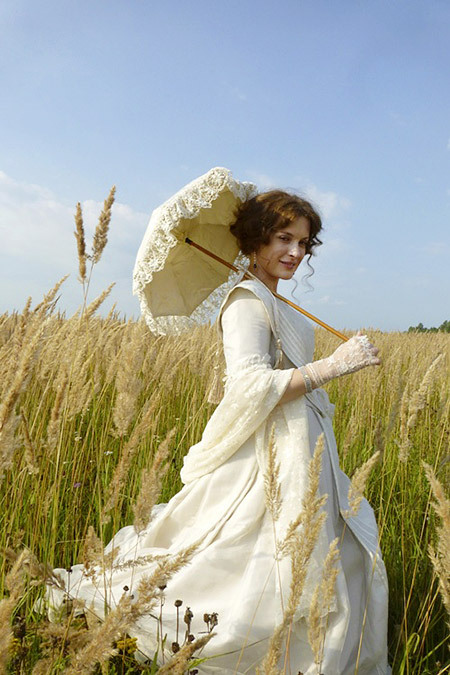
Natalya Petrovna (Anna Brenner-Vartanyan). Two Women (2014).
23 notes
·
View notes
Text
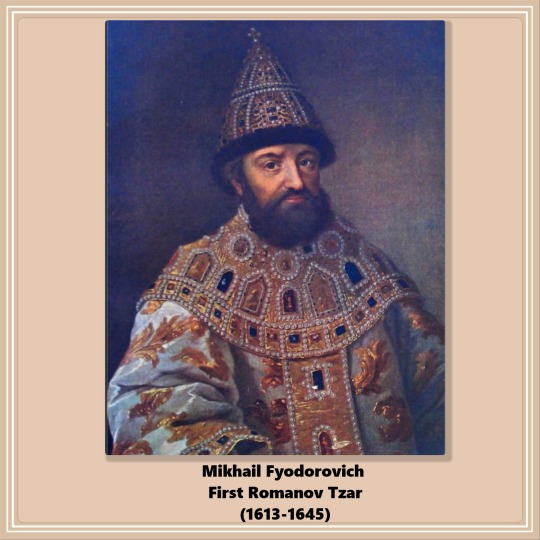




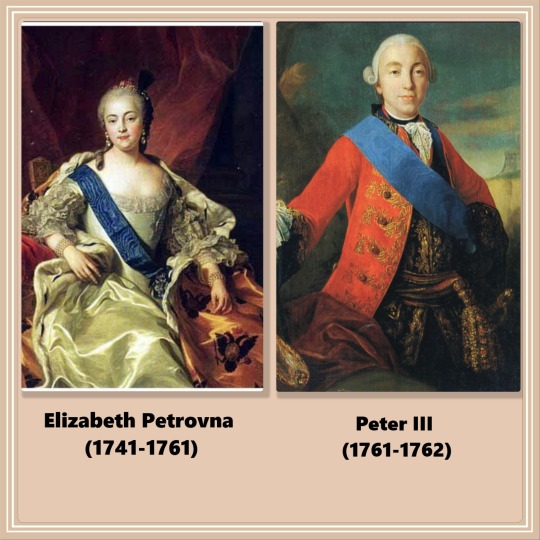

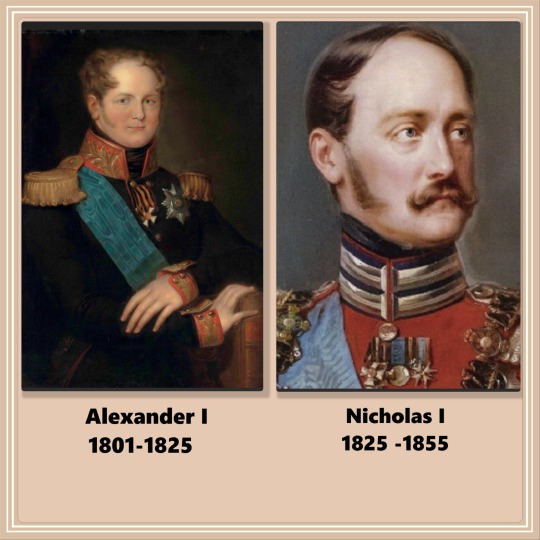

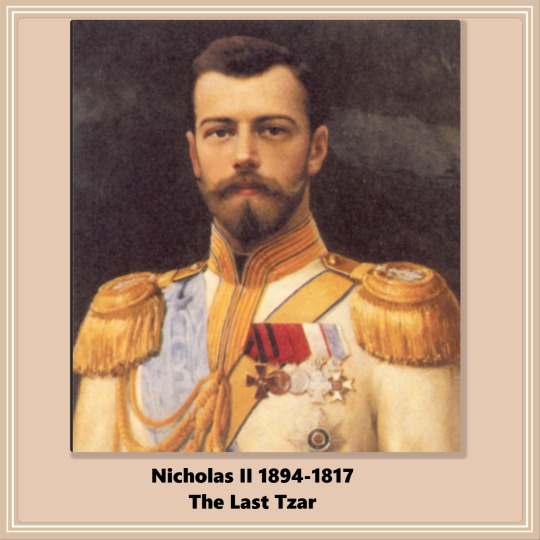
👑The Romanov Dynasty
The Grand Duchy of Moscow under Prince Ivan III was the first unified state on Russian territory. With him began the Rurikid Dynasty (the Rurikid had been around for a long time along hoards of tartars).
The Rurikid ruled from the 1400s until the 1600s. Ivan III can be considered the founder of Russia. While the Rurikid were in power, the Romanovs were boyars (nobles) in their courts. When the Ruriks became extinct, the Romanovs took over. The "Zemsky Sorbor" (a rudimentary parliament) elected Mikhail Feodorovich as the first Romanov Tzar.
The direct male line of the Romanovs ended with Elizabeth of Russia, who was childless. Her nephew Peter III, a member of the House of Holstein-Gottorp (a cadet branch of the German House of Oldenburg that reigned in Denmark), ascended to the throne and adopted his Romanov mother’s house name. Descendants after Elizabeth are sometimes referred to as "Holstein-Gottorp-Romanov."
The above is a gross oversimplification of a very complex course of events.
Highlights about each Romanov Tsar/Tsarina:
👑Mikhail Feodorovich (1613 - 1645): First Romanov Tsar
👑Alexei Mikhailovich (1645 - 1676): Encouraged trade and cooperation with Europe. Father of Peter the Great
👑Feodor III (1676 - 1682): Had very poor health and spent most of his reign in bed
👑Peter I and 👑 Ivan V (1689 - 1785): It was complicated. The two of them were Tsars under the regency of their older sister Sophia.
👑Peter I (1689-1725): Reformed Russia's politics, government, and culture. Made Russia a military power.
👑Catherine I (1725-1727): At the time of Peter the Great's death, the mechanism for succession consisted of the Tsar selecting his successor, but Peter did not elect one before dying. His wife became the Tsarina, but others governed through her.
👑Peter II (1727-1730): Peter's grandson; ascended the throne at 11 and died at 14. The "Privy Council" or "Soviet" ruled through him.
👑Anna Ioannovna (1730-1740): Daughter of Peter's half-brother Ivan. The Privy Council invited her to rule (wanting her to be a puppet), but she disbanded them and ruled herself successfully.
👑Ivan VI (1740-1741): One-year-old son of Ana's niece. She left the throne to him, expecting his mother to govern. Elizabeth, daughter of Peter the Great, deposed him (and his mother.)
👑Elizabeth Petrovna (1741-1761): Last Russian on the Russian throne; her twenty-year reign was successful.
👑Peter III (1761-1762): Grandson of Peter the Great and next in line for the throne after Elizabeth. Ruled for only half a year before being deposed by his wife, Catherine. He was murdered soon after the coup d’etat.
👑Catherine the Great (1762-1796): Her accomplishment went from the Empire’s territorial expansion to political development to the proliferation of sciences. However, the Empire had an enormous external debt by the end of her reign.
👑Paul I (1796-1801): Paul, the son of Catherine the Great and Peter III, became Emperor at 42 after the death of his mother. He started a lot of major military and political reforms. Paul was murdered in a coup d'etat. Paul decreed house laws for the Romanovs (the Pauline laws) – among the strictest in Europe – which established semi-Salic primogeniture and required Orthodox faith for the monarch and dynasts
👑Alexander I (1801-1825): During his reign, Russia defeated Napoleon's forces (which got as far as Moscow in their attempt to conquer Russia.) There was also great development in culture and arts.
👑Nicholas I (1825-1855): Paul I’s third son, younger brother of Alexander. Started railroad construction in Russia, boosting industrialization. Codified Russian laws and reformed finances.
👑Alexander II (1855-1881): His major reforms included the peasant emancipation of 1861, military reform, and the introduction of new types of self-governing village societies and more. Unfortunately, he fell victim to a terrorist after five attempts.
👑Alexander III (1881-1894): Russia didn’t enter any wars in his time. His domestic policy was conservative. He amended the Pauline laws. The economy flourished. But the revolution was brewing below the surface.
👑Nicholas II (1894-1917): His policies were unsuccessful. Established the first official Duma in 1905, but it was too little too late. With the advent of WWI, the Russian Empire ceased to exist. He abdicated. (gcl)
Sources:
Panov, A., Delaroche, P., & Abramuchkin, Y. (2021, July 31). The Complete List of Russian Tsars, Emperors, and Presidents. Russia Beyond. Retrieved June 20, 2023, from https://www.rbth.com/history/334065-complete-list-of-russian-tsars-emperors-rulers-presidents
#russian history#imperial russia#romanov dynasty#Nicholas II#Alexander III#Alexander II#Alexander I#Catherine I#Catherine II#Nicholas I#Paul III#Elizabeth Petrovna#Mikhail Feodorovich#Alexei Mikhailovich#Feodor III#Ivan VI#Peter I#Peter II#Peter III#Anna Ioannovna#Romanov Tsars#gcl
37 notes
·
View notes
Text
12 novembre … ricordiamo …
12 novembre … ricordiamo … #semprevivineiricordi #nomidaricordare #personaggiimportanti #perfettamentechic
2021: Mariana Prommel, Mariana Mosqueda Prommel, attrice e conduttrice televisiva argentina. La sua carriera fuori dal teatro inizia nel 1997, nel cortometraggio Kilómetro 22, e con la prima apparizione in una serie tv, Naranja y media. Dato il suo volto caratteristico, apparirà in numerose telenovele interpretando per lo più personaggi comici. Numerose altre telenovele seguirono negli anni…
#Aldo Silvani#Alfredo Bambi#Anna Petrovna Fesak#Anna Sten#Ágata Lys#Dria Paola#Eunice Quedens#Eve Arden#Gabriele Tinti#Gastone Tinti#Giuseppe Tagliavia#Grace Valentine#Jonathan Brandis#Jonathan Gregory Brandis#Luciano Marin#Margarita García San Segundo#Mariana Mosqueda Prommel#Mariana Prommel#Mario Merola#Pietra Giovanna Matilde Adele Pitteo#Robert Johnson#Robert Morris#Roberto Mauri#Violet Mersereau#William Franklin Beedle#William Holden
0 notes
Text
Masterlist
indicates smut**
indicates triggers!!
Peaky Blinders
18 Years
Take Your Medicine Sweetheart ‼️**
The One That Got Away ‼️**
Corruption **
Back to December
Dessert Before Dinner ‼️ **
An Unfair Loss ‼️
Imprisonment ‼️**
Reader cheats request ‼️*
Lucid Dreams
Piss kink request ‼️ **
Who’s The Other Girl? ‼️*
A Hole in The House ‼️**
Petrovna!Reader x Tommy request
Tommy after an argument request
A Crime for The Times ‼️ **
Tommy steals reader from John request ‼️*
dark!tommy request ‼️**
tommy x girly!reader headcanons
I’ll Always Be Your Boy ‼️
Harley Quinn reader request s3
Tommy thinks reader dies request
Voyeurism with Imaginary friends ‼️**
Tommy x step daughter reader ‼️*
Little!reader x Tommy request ‼️
Sister!reader caught smoking
Series
A Bump In The Night ‼️* ( 1 2 3 4 5 )
Cillian Murphy
To Have and To Hold ‼️*
Time Was Never on Our Side ‼️
An Act of Violation ‼️**
The Griever and The Grieving
A Lesson Learnt ‼️*
Jealous request **
"If I Say I Miss You, I Know That You Won't."
Watching The Detectives
A Secret ‼️*
The Exchange ‼️*
Read Your Diary ‼️*
An Odd Arrangement ‼️*
Oppenheimer
C for Credit ‼️*
Oppie being jealous request
Anna
Surrogacy request ‼️*
The Edge of Love
William seeing you nude
Series
Domesticity ( 1 2 3 4 5
A Quiet Place
“You Know I Got It, Come and Get It” ‼️*
Red Eye
Kitten. ‼️*
An Odd Arrangement ‼️*
An Assassination of The Heart ‼️
Insecure!reader request **
You Hate To Want Me. ‼️**
The Delinquent Season
An Ally Fuck ‼️**
Jim fucks his son’s ex request ‼️**
Jim x daughter's!best friend request ‼️*
Breakfast on Pluto
I’ll Be Your Girl **
Transition & Compromise ‼️
Protective!Mama Bear Kitten ‼️
A Much Needed Break
Lunch Break ‼️**
Criminal Minds
• Show Me Off (You Won’t) -college!Hotch x reader- ‼️*
Series
• Do You Remember That Night?
( 1 , 2, 3 , 4)
Deadpool
Heaven and Back **
#ranaewrites#tommy shelby#thomas shelby#aaron hotchner#Cillian murphy#Masterlist#william killick#jim#patricia braden#jackson rippner#Emmett#Oppenheimer#neil lewis#Leonard miller#lenny miller
430 notes
·
View notes
Text








For All Mankind | 4x04 - House Divided
It’s a poem Pushkin wrote in 1825. He wrote it to Anna Petrovna Kern, with whom he had an affair.
#HAPPY MARGO MONDAY#have some Margo unexpectedly finds herself part of a queer poetry recital#it is too long until the next episode I need more of them now#for all mankind#fam spoilers#margo madison#irina morozova#margo x irina#my gifs
102 notes
·
View notes
Text










Women’s History Meme || Empresses (4/5) ↬ Empress Yelisaveta Petrovna of Russia (1709 – 1762)
Yet Elizabeth’s flighty persona was a concoction to help her survive in a scorpions’ nest. While vaunting her numerous love affairs, she carefully concealed her political acumen. The British envoy’s wife reported, “In public she has an unaffected gaiety, and a certain air of giddiness that seems entirely to possess her whole mind… In private I have heard her talk with such a strain of good sense and steady reasoning that I am persuaded the other behavior is a feint.” … Numerous powerful families tried to persuade Elizabeth to stage a coup and proclaim herself empress. Afraid of bloodshed, Elizabeth hesitated until she heard rumors that Anna Leopoldovna was planning on claiming the imperial crown for herself and having her inconvenient cousin shut up in a convent. Elizabeth shuddered at the thought of religious life because, as one contemporary wrote, there was “not an ounce of nun’s flesh about her.” On November 25, 1741, hours before she was to be arrested, Elizabeth rallied loyal troops and invaded the palace. The coup was ridiculously easy; the people wanted the daughter of Peter the Great to rule. Anna was imprisoned in one fortress and her infant son in another. Elizabeth was gentle with her former enemies who now swarmed to proclaim their loyalty. She swore never to sentence anyone to death for political crimes. She outlawed the torture of children under seventeen and the cutting off of women’s noses. Even the humblest subjects were encouraged to hand Elizabeth petitions for redressing injustice. Unlike her three female predecessors—her mother, Catherine I; Empress Anna; and the regent Anna Leopoldovna—Elizabeth took her governmental responsibilities quite seriously, working most of the day, reading reports, presiding over meetings, forcing rival ministers to make peace. Mercurial and temperamental, Elizabeth had an arsenal of tactics to get her way—flashing a brilliant smile, stamping her foot in impatience, swearing like a fishwife, complimenting and cajoling. — Sex With the Queen: 900 Years of Vile Kings, Virile Lovers, and Passionate Politics by Eleanor Herman
#women's history meme#empress elizabeth of russia#house of romanov#russian history#european history#women's history#history#nanshe's graphics
39 notes
·
View notes
Text
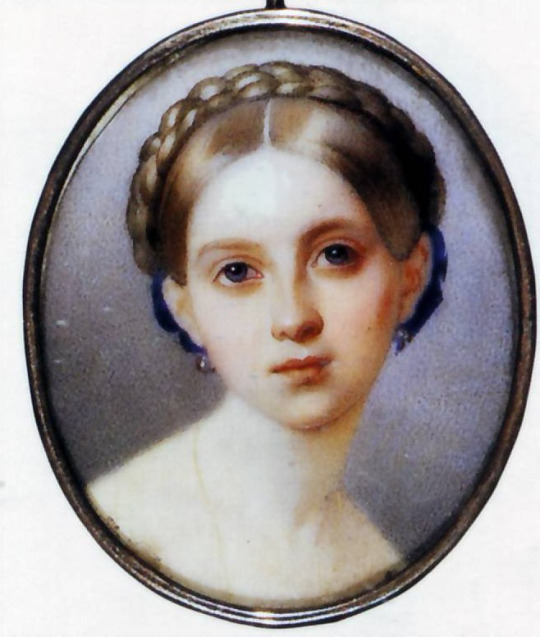
“… a sweet and docile creature… Although not beautiful, she is captivating with the freshness of her seventeen years of age, and also with the sincerity and kindness that shines on her face.”
— Anna Feodorovna Tyutcheva on Grand Duchess Alexandra Petrovna of Russia.
62 notes
·
View notes
Text

"Remote in my darkened exile, the days dragged by so slowly. Without grace. Without inspiration. Without life. Without tears. Without love. Then my spirit woke and you... you appeared again. Like a transient vision. Like pure beauty's spirit."
It’s a poem Pushkin wrote in 1825. He wrote it to Anna Petrovna Kern, with whom he had an affair. (Irina Morozova in episode 4x04 House Divided)
After almost two months of Season 4 finale, I wonder now what exactly the writers intended to do bringing in such a beautiful poem. Pretty clear that it echoes Margo and Sergei relationship. But I feel that such a heartbreaking piece didn’t meet the expectations we had in the couple. Firstly, because the writers only brought them together for only two scenes but, especially because I feel unsatisfied with both scenes.
In the first scene, the expected reunion after 8 long years, we have them keeping the distance and also they sounded like reprimanding each other. WTF. And in the second, in a far safer environment, they still aren’t able to break the distance or to pour out their feelings. Not to mention Margo’s reluctance to take the risk with him and the poor editing that didn’t show how Margo covers his hand with hers. Finally, to make matters worse, the episode 4x09 ending. It feels the writers were making fun of them with the burgers thing. 😰
The bottom line is that I didn’t feel the writers made justice to them at the end after such a wonderful beginning back in season 2. Thankfully fan fiction writers (god bless them 🙏🏼) come up with more satisfying ideas to fill the gap they left.
23 notes
·
View notes
Text
The Bear the Nightingale Book Review

The Bear and the Nightingale by Katherine Arden Book Review
This book is so different from what I would normally read.
I was browsing the shelves at Barnes and Noble as I’m prone to do when I picked up a YA book with a beautiful cover.
I don’t recall what the book was, but I decided to check out the reviews for it on Goodreads to determine whether I should purchase it or not.
On Goodreads, the overwhelming statement being made about this forgotten YA book was that it was the poor man’s version of The Bear and the Nightingale.
Intrigued, I wandered a shelf or two over until I found The Bear and the Nightingale itself and decided to buy it. The Bear and the Nightingale at its core is a novel steeped in Russian folklore.
It tells the story of Vasilisa Petrovna, a young girl with the powers to see spirits and otherworldly creatures.
Starting from Vasya’s birth up until she’s on the brink of womanhood, you learn about Vasya’s mother Marina, who dies in childbirth, all of Vasya’s siblings, her father, Pyotr, and their small Russian village on the outskirts of metropolitan cities like Moscow and Vladimir.
The plot revolves around Vasya’s deep connection with the spirits and guardians that live in and around her home and the disturbance that shakes them and the village with the arrival of a priest, Konstantin Nikonovich.
Father Konstantin thinks that Vasya’s village is backwards for their savage reverence towards the old gods and sets the village and its people on a path of devoted fear and cruel judgment.
Soon enough, everyone thinks Vasya is a cursed witch and the people who once loved her now cast her aside, both out of cowardice and obedience from Father Konstantin.
However, the person who hates Vasya the most is her stepmother, a righteous, pious woman who is the only other person in the village who can see the spirits.
Unlike Vasya, who sees the creatures as guardians, Anna sees the creatures as devils out to damn her and her daughter, a curse she has borne to bear and has never been able to get rid of.
As the village falls away from the old, traditional times, the spirits grow weak and infirm. From this fragility and vulnerability, the devil, Medved the Bear, grows stronger.
\With his newfound power, he turns the dead into upyrs, brings about bitterly freezing winters, dry summers, and poor harvests, cursing the people of the village slowly but surely.
The only one who can stop Medved is his brother, Morozko, the winter king known as death himself. Teaming up with Morozko, Vasya must fight back against the evil that threatens her village, putting herself and her loved ones in perilous danger.
I feel like there’s more to this plot and yet, this is the best summary I can come up with. At its core, The Bear and the Nightingale is a retelling of the Russian fairytale of Frost, the blue-eyed winter demon.
In the fairytale (which Vasya’s nurse Dunya tells her at the beginning of the story) a witch-girl from the village comes across Morozko, who is so taken with her beauty and courage that he gives her a bountiful dowry upon her return home.
Arden takes this classic fairytale and turns Vasya from a beautiful damsel into a fierce witch that refuses to marry, be sent off to a convent, or be shackled in any way to God or to man.
The most astounding part of this book for me was the Russian folklore influence. Folk stories of any kind have always been fascinating and it’s always so intriguing to learn about myths and stories from other cultures.
I’ve never heard of the Frost demon and while Arden turns the story contemporary with Vasya being an independent woman, the rest of the story is steeped in Russian lore, language, and history.
The way that Arden wrote this book reads like a fairytale. With a lot less focus on dialogue and traditional methods of exposition, rising action, climax, falling action, and resolution, the book rises and falls like a fairytale would.
It was a lot of telling not showing, which I’m usually fiercely opposed to, but in this case, it was inherently intentional. It’s as if, Dunya, Vasya’s nurse, was telling the story the whole time, from start to finish.
It reads in a lyrical, poetic way, very different from other novels and a breath of fresh air for pure ingenuity.
The characters themselves were also good. Just like in a fairytale, they don’t have the deepest of characterizations, but that’s also not the point. They’re archetypes, lessons for young ears to hear and heed.
I find it a bit strange that Vasya had the mentality of a young woman growing up in the year 2024, but it’s also forgivable. Arden wasn’t trying to create a fully functioning fairytale that’s wholly accurate.
There are some other critiques I have, especially towards the ending. It felt like the climax came out of nowhere, with not much of a build to hit the ground running as a reader, and the death of a certain character was inexplicably vague and unimportant.
But Arden’s decision to base Vasya’s story on a fairytale, twist it with modern sensibilities, and sprinkle in some magic and poetry—is a concoction that clearly worked as the book is a national bestseller.
Recommendation: Overall, I enjoyed The Bear and the Nightingale. While it’s not something I would usually read, as stated at the beginning, I liked the reset. Every once in a while it’s refreshing (and needed) to get away from the typical YA love triangle or slow-burn romance, from the humdrum fantasies and the summer flings.
It deepens my appreciation for literature, expands my horizons, and teaches me something new, which—isn’t that what we’re always looking for as readers?
Score: 7/10
#book blog#the bear and the nightingale#katherine arden#favorite books#book review#book#book reflection#book recommendations#book rec#popular books#top books#popular fiction#book reccs#fairy tales#russian literature#russian folklore#7/10
15 notes
·
View notes
Text
Women of Imperial Russia: Ages at First Marriage
I have only included women whose birth dates and dates of marriage are known within at least 1-2 years, therefore, this is not a comprehensive list. This data set ends with the Revolution of 1917.
Eudoxia Lopukhina, wife of Peter I; age 20 when she married Peter in 1689 CE
Catherine I of Russia, wife of Peter I; age 18 when she married Johan Cruse in 1702 CE
Anna of Russia, daughter of Ivan V; age 17 when she married Frederick William Duke of Courland and Semigallia in 1710 CE
Anna Petrovna, daughter of Peter I; age 17 when she married Charles Frederick I, Duke of Holstein-Gottorp, in 1725 CE
Catherine II, wife of Peter III; age 16 when she married Peter in 1745 CE
Natalia Alexeievna, wife of Paul I; age 17 when she married Paul in 1773 CE
Maria Feodorovna, wife of Paul I; age 17 when she married Paul in 1776 CE
Elizabeth Alexeivna, wife of Alexander I; age 14 when she married Alexander in 1793 CE
Anna Feodorovna, wife of Konstantin Pavlovich; age 15 when she married Konstantin in 1796 CE
Alexandra Pavlovna, daughter of Paul I; age 16 when she married Archduke Joseph of Austria in 1799 CE
Elena Pavlovna, daughter of Paul I; age 15 when she married Frederick Louis, Duke of Mecklenburg-Schwerin in 1799 CE
Maria Pavlovna, daughter of Paul I; age 18 when she married Charles Frederick, Grand Duke of Saxe-Weimar-Eisenach in 1804 CE
Catherine Pavlovna, daughter of Paul I; age 21 when she married Duke George of Oldenburg in 1809 CE
Anna Pavlovna, daughter of Paul I; age 21 when she married William II of the Netherlands in 1816 CE
Alexandra Feodorovna, wife of Nicholas I; age 19 when she married Nicholas in 1817 CE
Joanna Grudzinska, wife of Konstantin Pavlovich; age 29 when she married Konstantin in 1820 CE
Elena Pavlovna, wife of Mikhail Pavlovich; age 17 when she married Mikhail in 1824 CE
Maria Nikolaevna, daughter of Nicholas I; age 20 when she married Maximilian de Beauharnais, Duke of Leuchtenberg, in 1839 CE
Maria Alexandrovna, wife of Alexander II; age 17 when she married Alexander in 1841 CE
Elizaveta Mikhailovna, daughter of Mikhail Pavlovich; age 17 when she married Adolphe, Grand Duke of Luxembourg, in 1844 CE
Alexandra Nikolaevna, daughter of Nicholas I; age 19 when she married Prince Frederick-William of Hesse-Kassel, in 1844 CE
Olga Nikolaevna, daughter of Nicholas I; age 24 when she married Charles I of Wurttemberg, in 1846 CE
Alexandra Iosifovna, wife of Konstantin Nikolaevich; age 18 when she married Konstantin in 1848 CE
Catherine Mikhailovna, daughter of Mikhail Pavlovich; age 24 when she married Duke Georg August of Mecklenburg-Strelitz, in 1851 CE
Alexandra Petrovna, wife of Nicholas Nikolaevich the Elder; age 18 when she married Nicholas in 1856 CE
Olga Feodorovna, wife of Michael Nikolaevich; age 18 when she married Michael in 1857 CE
Maria Feodorovna, wife of Alexander III; age 19 when she married Alexander III in 1866 CE
Olga Konstantinovna, daughter of Konstantin Nikolaevich; age 16 when she married George I of Greece in 1867 CE
Vera Konstantinovna, daughter of Konstantin Nikolaevich; age 20 when she married Duke Eugen of Wurttemberg in 1874 CE
Maria Pavlovna, wife of Vladimir Alexandrovich; age 20 when she married Vladimir in 1874 CE
Maria Alexandrovna, daughter of Alexander II; age 19 when she married Alfred, Duke of Edinburgh, in 1874 CE
Anastasia Mikhailovna, daughter of Michael Nikolaevich; age 19 when she married Friedrich Franz III, Duke of Mecklenburg-Schwerin in 1879 CE
Nadezhada Alexandrovna Dreyer, wife of Nicholas Konstantinovich; age 21 when she married Nicholas in 1882 CE
Elizabeth Feodorovna, wife of Sergei Alexandrovich; age 20 when she married Sergei in 1884 CE
Olga Valerianovna Paley, wife of Paul Alexandrovich; age 19 when she married Erich von Pistolhkors in 1884 CE
Elizabeth Mavrikievna, wife of Konstantin Konstantinovich; age 19 when she married Konstantin in 1885 CE
Anastasia of Montenegro, wife of Nicholas Nikolaevich the Younger; age 21 when she married George Maximilianovich, Duke of Leuchtenberg in 1889 CE
Milica of Montenegro, wife of Peter Nikolaevich; age 23 when she married Peter in 1889 CE
Alexandra of Greece and Denmark, wife of Paul Alexandrovich; age 19 when she married Paul in 1889 CE
Sophie Nikolaievna, wife of Michael Mikhailovich; age 23 when she married Michael in 1891 CE
Victoria Feodorovna, wife of Kirill Vladimirovich; age 18 when she married Ernest Louis, Grand Duke of Hesse, in 1894 CE
Xenia Alexandrovna, wife of Alexander Mikhailovich; age 19 when she married Alexander in 1894 CE
Alexandra Feodorovna, wife of Nicholas II; age 22 when she married Nicholas in 1894 CE
Olga Alexandrovna, daughter of Alexander II; age 18 when she married Count George-Nicholas von Merenberg in 1985 CE
Maria of Greece and Denmark, wife of George Mikhailovich; age 24 when she married George in 1900 CE
Alexandra von Zarnekau, wife of George Alexandrovich; age 16 when she married George in 1900 CE
Catherine Alexandrovna, daughter of Alexander II; age 23 when she married Alexander Baryatinksy in 1901 CE
Olga Alexandrovna, daughter of Alexander III; age 19 when she married Duke Peter Alexandrovich of Oldenburg
Elena Vladimirovna, daughter of Vladimir Alexandrovich; age 20 when she married Prince Nicholas of Greece and Denmark in 1902 CE
Natalia Brasova, wife of Michael Alexandrovich; age 22 when she married Sergei Mamontov in 1902 CE
Elisabetta di Sasso Ruffo, wife of Andrei Alexandrovich; age 31 when she married Alexander Alexandrovitch Frederici in 1907 CE
Maria Pavlovna, daughter of Paul Alexandrovich; age 18 when she married Prince Wilhelm of Sweden in 1908 CE
Helen of Serbia, wife of Ioann Konstantinovich; age 27 when she married Ioann in 1911 CE
Tatiana Konstantinovna, daughter of Konstantin Konstantinovich; age 21 when she married Konstantine Bagration of Mukhrani, in 1911 CE
Irina Alexandrovna, daughter of Alexander Mikhailovich; age 19 when she married Felix Felixovich Yusupov in 1914 CE
Nadejda Mikhailovna, daughter of Michael Mikhailovna; age 20 when she married George Mountbatten in 1916 CE
Antonina Rafailovna Nesterovkaya, wife of Gabriel Konstantinovich; age 27 when she married Gabriel in 1917 CE
Nadejda Petrovna, wife of Nicholas Orlov; age 19 when she married Nicholas in 1917 CE
Anastasia Mikhailovna, daughter of Michael Mikhailovna; age 25 when she married Sir Harold Wernher in 1917 CE
59 women; average age at first marriage was 20 years old. The oldest bride was 31 at her first marriage; the youngest was 14.
19 notes
·
View notes
Text
Ok here is my list s I can pin it . It is fun to write out their full names even if it makes me look isnane.
jimmy list:
MAIN F/Os:
Nastasya Filippovna Barashkova 🫠
Varvara Petrovna Stavrogina 🪆
Katerina Lvovna Ismailova 🍧
[Tolstoy]
Princess Marya Nikolayevna Bolkonskaya ⛪️
Princess Anna Mikhailovna Drubetskaya 🤭
Julie Karagina 🥀
Countess Hélène Vasilyevna Bezukhova 🕯️
Anna Arkadyevna Karenina 🚂
[Dostoevsky]
Elena Ivanovna 🐊
Katerina Ivanovna Marmaladova 🩻
Aglaya Ivanovna Yepanchina 🦔
Agrafena “Grushenka” Alexandrovna Svetlova 🧅
Yulia Mikhailovna Von Lembke 🫖
Katerina Osipovna Khokhlakova ⚜️
[Others]
Anna Sergeevna Odintsova 🦚 (Fathers and Sons)
Avdotia “Evdoksya” Nikitishna Kukshina (Fathers and Sons)
Yelena Andreevna Serebryakova 🎹 (Uncle Vanya)
Anna Petrovna Voynitseva (Platonov)
Tisbe (La Cenerentola)
Caroline Bingley (Pride and Prejudice)
Lady Susan Vernon (Lady Susan)
Rebecca "Becky" Crawley (Vanity Fair)
Ana Ozores (La Regenta)
Obdulia Fandiño (La Regenta)
And Anatole Kuragin 🦆 is my main platonic guy
That is all.
12 notes
·
View notes